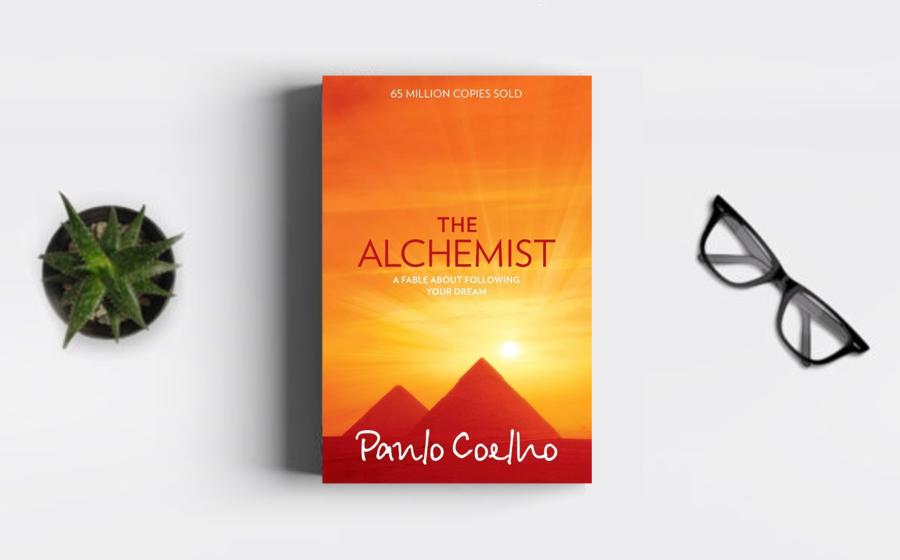"The Alchemist" by Paulo Coelho is a profound and
enchanting novel that weaves together elements of
adventure, spirituality, and self-discovery. The story
follows Santiago, a shepherd boy from Andalusia, as he
embarks on a transformative journey in search of a
hidden treasure and, in the process, discovers the true
desires of his heart and the essence of his own personal
legend.
At its core, "The Alchemist" is a tale of
following one's dreams and listening to the heart's
deepest desires. Santiago's journey begins when he meets
a mysterious king who imparts the wisdom that "when you
want something, all the universe conspires in helping
you to achieve it." This sets the stage for Santiago's
quest to pursue his Personal Legend, a concept central
to the novel that represents an individual's true
purpose and calling in life.
The narrative
unfolds against the backdrop of diverse landscapes, from
the Spanish countryside to the bustling markets of
Tangier and the vast expanse of the Egyptian desert.
Each location serves as a metaphor for different stages
of Santiago's spiritual and personal growth. The novel's
rich symbolism, combined with Coelho's lyrical prose,
creates a tapestry of meaning that resonates with
readers on a deep and soulful level.
One of the
key themes in "The Alchemist" is the idea that the
pursuit of one's dreams requires courage and a
willingness to embrace the unknown. Santiago faces
numerous challenges and encounters various mentors who
guide him along his journey. The crystal merchant,
Melchizedek the king, and the Englishman are just a few
of the characters who impart valuable lessons to
Santiago, emphasizing the importance of perseverance,
faith, and the interconnectedness of all things.
The concept of Personal Legend encourages readers to
reflect on their own aspirations and the unique path
they are meant to tread. Coelho suggests that everyone
has a destiny, a purpose that aligns with their truest
self. By following their dreams and heeding the call of
their hearts, individuals can unlock a reservoir of
untapped potential and live a life of fulfillment.
Santiago's encounters with various characters and
situations symbolize the universal truths and archetypal
challenges that individuals face on their journeys. The
novel invites readers to consider their own quests and
the obstacles they must overcome to achieve their
Personal Legend. This introspective exploration serves
as a source of inspiration, prompting readers to connect
with their deepest aspirations and set out on their own
transformative journeys.
A central metaphor in
the book is the idea of turning base metal into gold, a
pursuit associated with alchemy. This alchemical process
serves as a powerful symbol for personal transformation
and the refinement of the soul. Santiago's journey
mirrors the alchemist's quest to transmute the ordinary
into the extraordinary, highlighting the transformative
power that lies within each individual.
Furthermore, "The Alchemist" introduces the concept of
the Soul of the World, a force that connects all living
things and plays a vital role in Santiago's journey.
This interconnectedness underscores the idea that every
individual is part of a larger cosmic plan. Coelho's
narrative encourages readers to recognize the
significance of their own journeys within the broader
context of the universe, fostering a sense of purpose
and interconnectedness.
The novel also explores
the theme of fear and its impact on realizing one's
dreams. Santiago learns that fear is a natural part of
the journey but should not be allowed to dictate one's
actions. The fear of the unknown, the fear of failure,
and the fear of pursuing one's dreams are common
obstacles that individuals face. "The Alchemist"
inspires readers to confront their fears, understanding
that they are an integral part of the journey toward
self-discovery and fulfillment.
Moreover, the
character of Santiago undergoes a profound
transformation throughout the story, evolving from a
simple shepherd boy into a wise and enlightened
individual. This transformation serves as a testament to
the potential for growth and self-realization that
exists within each person. Santiago's journey inspires
readers to embrace change, challenges, and personal
evolution as essential elements of their own quests for
fulfillment.
"The Alchemist" also emphasizes the
importance of mindfulness and living in the present
moment. Santiago learns to appreciate the beauty of the
desert, the simplicity of life as a shepherd, and the
significance of each encounter on his journey. This
mindfulness encourages readers to savor the richness of
their own experiences, fostering gratitude and a deeper
connection to the present.
One of the most iconic
elements of "The Alchemist" is the recurring theme of
the Language of the World, a form of communication that
transcends spoken words. Santiago learns to listen to
the signs and omens that guide him toward his destiny.
This concept encourages readers to develop a heightened
awareness of the messages and opportunities that present
themselves in their own lives, reinforcing the idea that
the universe conspires to help individuals achieve their
dreams.
The novel's enduring popularity and
widespread acclaim can be attributed to its universal
themes and the timeless wisdom it imparts. "The
Alchemist" has resonated with readers across cultures
and generations, becoming a cherished literary work that
transcends geographic and linguistic boundaries. Its
ability to inspire people lies in its capacity to touch
the core of human experience, addressing universal
aspirations, fears, and the quest for meaning and
purpose.
"The Alchemist" is a captivating and transformative journey that inspires readers to pursue their dreams, confront their fears, and discover the true desires of their hearts. Paulo Coelho's masterpiece weaves together elements of adventure, spirituality, and self-discovery, creating a narrative that transcends cultural and temporal boundaries. Through Santiago's quest for his Personal Legend, readers are encouraged to embark on their own journeys of self-realization, personal growth, and the pursuit of fulfillment.






